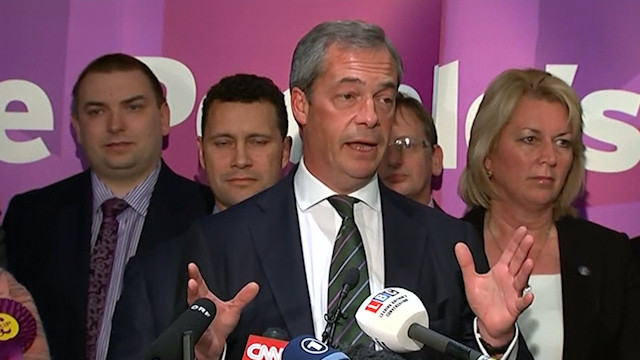Nigel Farage Faces 'Catch 22' as He Looks to Win in Westminster

Nigel Farage insists his local and EU election victories have set Ukip on the path to Westminster and he predicts it will win a number of seats and possibly even hold the balance of power in the Commons after the 2015 election.
Irrespective of how realistic that vision is - and many still believe the Ukip bubble will burst, starting with next week's Newark by-election - it presents him with an uncomfortable "Catch 22" dilemma.
He has accepted that the ramshackle, ill-disciplined party which Ukip has so far been must get its act together now it has ambitions to become a serious force in Westminster politics.
For a start, he has announced the party needs to move on from its one-man-band image by appointing spokesmen on key portfolios including defence, health, education, home affairs and so on.
The country needed to hear less from him and more from other party figures, he declared.
Those individuals will, however, need to know what the party policy on the aforementioned issues is, particularly as Farage has claimed the last election manifesto has been shredded and he is starting again with a blank sheet of paper.
So he is going to have to hammer out a comprehensive manifesto for the general election campaign that will withstand the sort of intense scrutiny and line-by-line analysis that will follow.
If he wants Ukip to compete with the big parties he must be ready to answer detailed questions on, for example, taxation, where he has previously favoured a single rate for everyone, rich and poor.

No one currently knows what Ukip's policy on education is, beyond the re-introduction of grammar schools.
At least one senior figure has suggested that the party is in favour of wholesale privatisation of the health service. And, bearing in mind his nationalism, it can be assumed he will have a detailed and robust defence policy.
At the moment, Farage's manifesto would be a single sheet of paper with the sentences "withdrawal from the EU" and "introducing Australian-style, points-based immigration controls" featuring prominently, if not exclusively.
The people speaking on those briefs will also need to be able to withstand the sort of political and even personal scrutiny Farage has himself been subjected to of late, and which has already caught out some of his team.
And they will have to maintain a consistent policy line if they are to avoid charges of internal divisions and confusion.
One way to ensure all that, of course, is to have a strong and all-pervasive media operation.
The appointment of the former Daily Express columnist Patrick O'Flynn was a definite step in the right direction. But he has now been elected to the European Parliament and admitted he will have to take a step back.
So, presumably, we can expect to see the appointment of a new media co-ordinator, or perhaps even a team.
And here is the obvious catch. If Ukip does all that - and it will probably have to for simple practical reasons ahead of an election campaign - it will start to look just like any other political party. Bang goes part of its anti-establishment posture.
And those who supported it purely on its anti-EU, anti-immigration manifesto will be asked to support a whole range of other policies. And will those "left behind" old Labour supporters be attracted to a flat-tax levying, NHS-privatising party?
Farage's surge in the local and EU elections may have given his party a huge boost. But it has also landed him with some of the same old problems that face every other establishment political party.
© Copyright IBTimes 2025. All rights reserved.






















